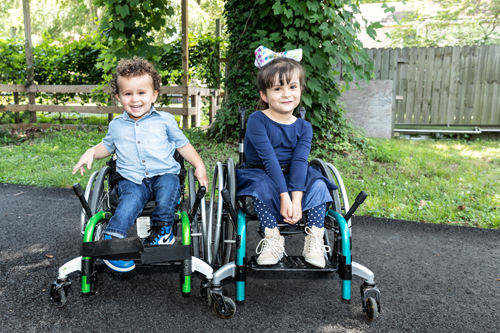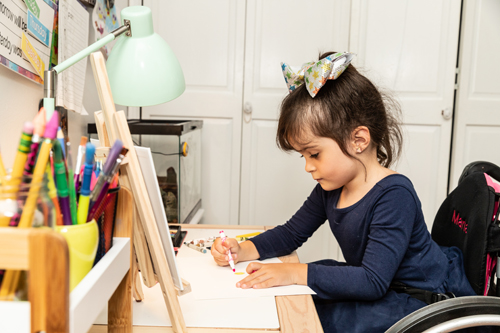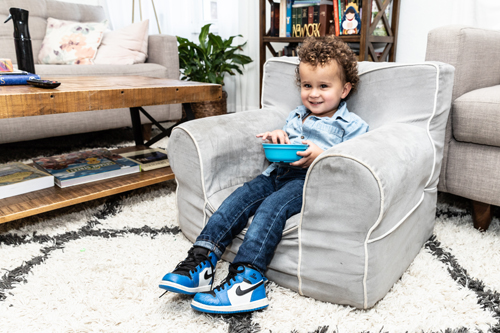 Six-year-old Maria Pocta of Virginia Beach leans toward her little brother and plucks a daisy from his grasp, placing it in her hair above her left ear. Three-year-old Andrew Joseph grins and turns away, a signal to his sister to chase him through the gardens of their backyard.
Six-year-old Maria Pocta of Virginia Beach leans toward her little brother and plucks a daisy from his grasp, placing it in her hair above her left ear. Three-year-old Andrew Joseph grins and turns away, a signal to his sister to chase him through the gardens of their backyard.
Between the rows of rose bushes, he slows and turns to her as he giggles, as if to say, “You’ll never catch me.” It is pure, wholesome child’s play, but with a twist.
Andrew Joseph is trying to give his sister the slip in his special needs wheelchair. Maria gives chase in her own wheelchair.
Maria and Andrew Joseph were both born with spina bifida, a birth defect that occurs when the spine doesn’t develop normally, resulting in an opening over part of the spinal cord.
Spina bifida can range from mild to severe: The location, size, and type of defect determines the severity. In the case of the Pocta siblings, their spinal cords developed outside of the body and were contained in a fluid-filled sac protruding from their backs, called a myelomeningocele, which requires delicate neurosurgery to repair.
Maria is paralyzed from the waist down; Andrew Joseph’s paralysis is less severe, affecting him only below the knees.
Fortunately, the Pocta family has CHKD to help with Maria and Andrew Joseph’s varied medical needs. And for children with spina bifida, there are many.
These special patients require multidisciplinary care and therapy from a variety of surgeons and specialists. They need neurosurgery and plastic surgery to close the opening of the spine. As they grow, they need orthopedic surgery to ensure proper development of their bones. And to keep their bodies functioning, they receive care from urologists, nephrologists, and gastroenterologists, plus physical and occupational therapists.

Because patients like Maria and Andrew Joseph face many medical challenges and must see many providers, CHKD brings everyone together for them through the Spina Bifida Clinic, where families can see multiple specialists, complete testing, and receive a variety of services during one appointment.
“A parent could spend an entire week just driving to see all of their child’s providers independently,” says Dr. Joseph Dilustro, a CHKD pediatric neurosurgeon. “Pulling together a variety of pediatric services is something only a children’s hospital like CHKD can do. It gives the family the chance to have a life beyond spina bifida.”
The siblings’ parents, Cristina and Andrew, agree. They credit CHKD’s approach as a defining factor in their ability to balance all they have on their plates. “The doctors all work as a team,” says Cristina. “If we were seeing five different doctors for each child, it would be a real challenge just to get to all the appointments. Then the doctors would have to find time to communicate with each other and then to get back to us. Thanks to the clinic, we get to see them all at the same time, and they come to the table already on the same page.”
In addition to Dr. Dilustro, the core group of CHKD doctors on Maria and Andrew Joseph’s care team includes orthopedic surgeon Dr. Carl St. Remy, urologist Dr. Louis Wojcik, gastroenterologist Dr. Orhan Atay, and nephrologist Dr. Irene Restaino.
“We love them all. They treat us with dignity and understanding at every turn,” Cristina says. “They go out of their way to make sure we are getting the very best treatment, and they confer with one another on the spot so we aren’t waiting for days to see what’s next.”
For instance, when the siblings needed minor surgery in February to correct issues with the development of their lower legs and feet, Dr. St. Remy conveniently scheduled both for the same morning.
 “The goal right now is to keep Maria and Andrew Joseph’s limbs balanced without deformity,” says Dr. St. Remy. “If we can minimize deformities, there is a possibility that as technology progresses and advanced equipment becomes available, they will be better prepared to use those new devices to walk independently.”
“The goal right now is to keep Maria and Andrew Joseph’s limbs balanced without deformity,” says Dr. St. Remy. “If we can minimize deformities, there is a possibility that as technology progresses and advanced equipment becomes available, they will be better prepared to use those new devices to walk independently.”
CHKD’s Spina Bifida Clinic, which follows patients to adulthood, goes beyond gathering doctors and scheduling surgical procedures. CHKD’s Care Connection for Children regularly participates in the clinic, giving families access to case managers and other personnel who help coordinate follow-up care and provide support services in the community.
The Care Connection for Children program at CHKD is funded by a grant from the Virginia Department of Health for children with chronic physical disabilities. “We help to provide access to available community resources and activities, such as inclusive summer camps, and refer and educate about Medicaid waivers and in-home support,” says Candace Collins, a community care coordinator at CHKD. “We are here to assist in the many details of a child’s medical care and collaborate with the child’s medical team.”
Thanks to support from CHKD, the Pocta family can focus on letting Maria and Andrew Joseph just be kids. They like to dance, swing at the playground, play baseball, swim in their backyard, and chase animals. They have even tried surfing. Cristina and Andrew set few limits on what they can do and where they can go.
“Mom came to me a few years ago wanting to take Maria to the Dominican Republic to see family,” says Dr. Atay. “She did not allow the challenges of traveling with a young child with spina bifida to deter her. Instead, she learned everything she could about specific care routines. Now, I am more like an adviser.”
Both children have big smiles and bright personalities, and they embrace every second of freedom they have to keep rolling.
Their father gives CHKD a share of the credit for their steadiness and confidence. “When we take the kids to CHKD, it doesn’t feel like a hospital, it feels like a community,” says Andrew. “Everyone there has a very special place in our hearts.”
This story appeared in the Fall 2018 edition of Kidstuff magazine, a quarterly publication from CHKD that features inspiring stories about patients, families, physicians and friends of CHKD. Make a donation to receive Kidstuff magazine by mail.